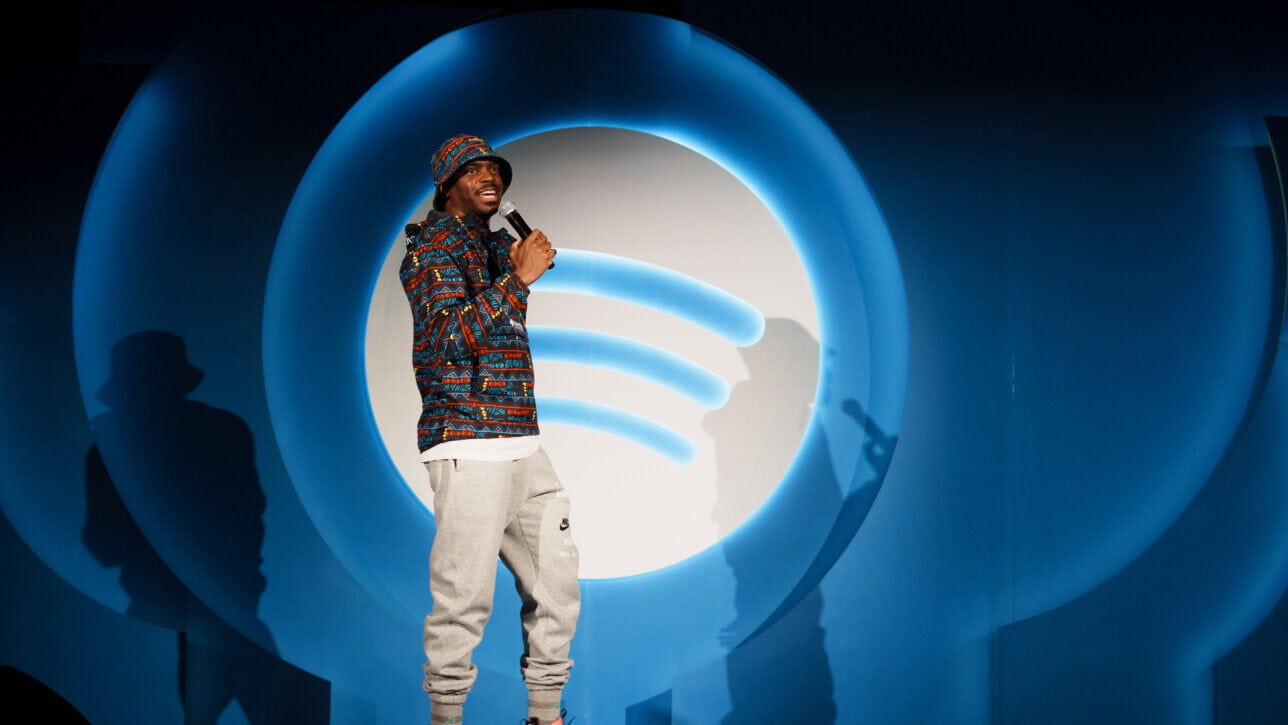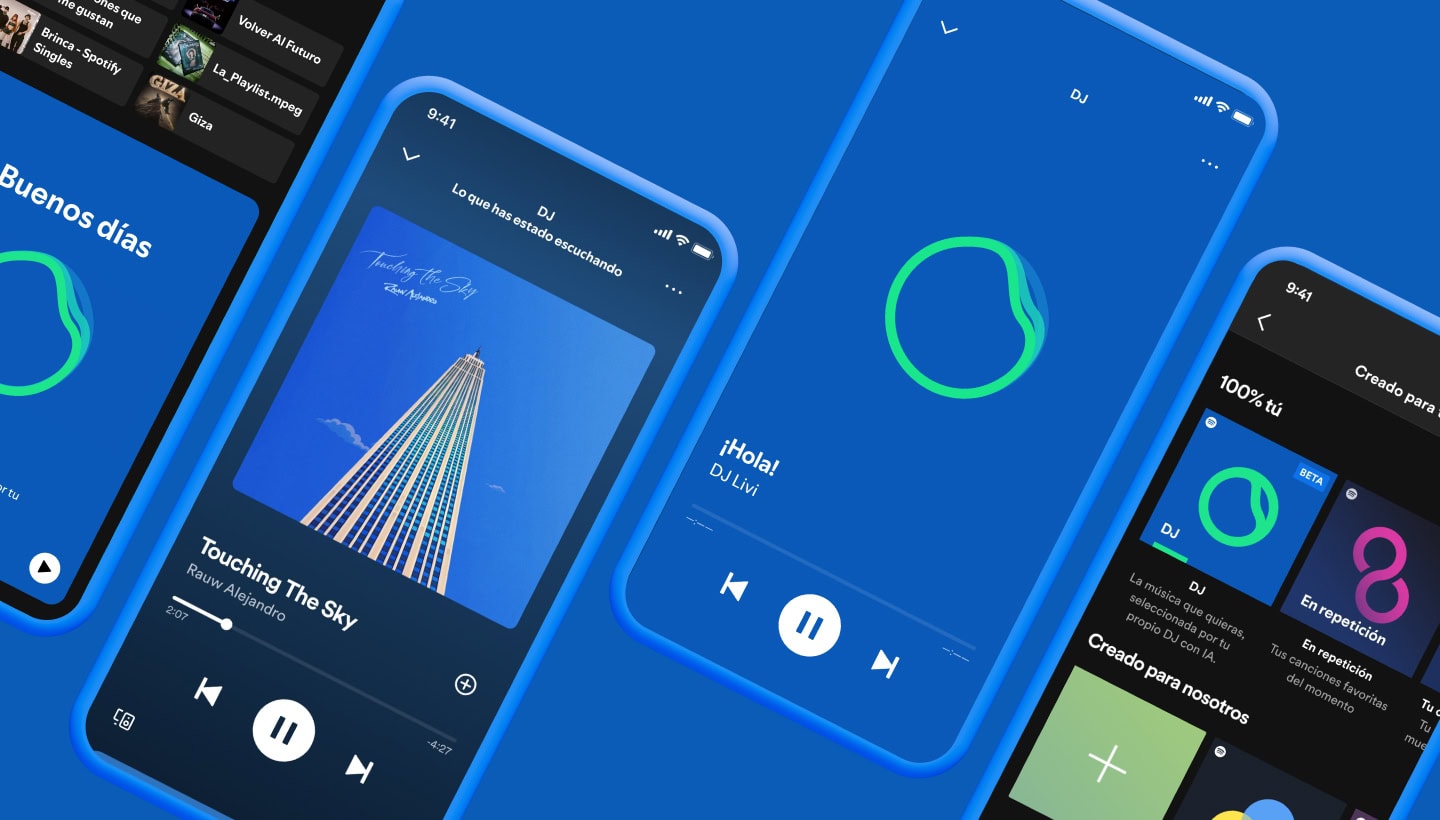Spotify’s Xavier “X” Jernigan sat down with Boardroom to reflect on his career working in the music industry and how it led him to become the voice behind the music streamer’s AI DJ.
If you’ve ever opened Spotify and been greeted by a warm, conversational voice introducing new music, you’ve likely met Xavier “X” Jernigan — the real-life inspiration and voice model behind AI DJ X, the streaming giant’s personalized, always-on music guide.
In this conversation with Boardroom, Jernigan reflects on his career journey, the process of training his AI voice, and why keeping a human touch in AI-powered tools is non-negotiable.
This interview has been edited for length and clarity.
BOARDROOM: Before we get into AI DJ, can you walk me through your career path and how you landed your full-time role at Spotify?
XAVIER JERNIGAN: I’ve been at Spotify for almost 10 years. I started as Head of North America for our music editorial team, leading human curation for the U.S. and Canada. Then I created a team called Cultural Partnerships to keep a finger on the pulse of culture and reflect that on-platform.
We partnered with Netflix, Disney, and Insecure, building official playlists, getting songs live ahead of episodes, and solving a problem fans didn’t know they had — “What was that song?”
At the same time, I started getting asked to host podcasts and internal events. That turned into a full-time hosting role and eventually in-house talent. I hosted The Get Up, Spotify’s morning show, merging talk with personalized music. It became a top 10 podcast on the platform.
A couple of years later, AI DJ came along. They’d been developing a prototype voice that kept reminding people of me. Eventually, they said, “This should be X,” reached out, and that’s how I got involved.
Once you agreed to be a part of AI DJ, what was the process like for capturing and training your voice?
The voice model training is like a recording session. I go in with lines of script — things I’d naturally say as DJ X — and voice act as myself. My goal is to sound like I’m talking to one person, not millions. I picture us in a car — you’re driving, and I’m on the aux cord putting you on to the latest music.
I keep an exhaustive list of all the ways I greet people, so even my onboarding line, “Hey, what’s going on? My friends call me X…” came straight from me. Every word choice reflects my personality.
We also have a writer’s room of scriptwriters, data curators, and the music editorial team who help shape recommendations. And because playfulness is a core value at Spotify, we bring fun into the mix — like our April Fool’s prank where I “took you back to the hits from 1,000 years ago” before dropping Gregorian chanting and saying, “Got you.”

Did you ever think this would be part of your career?
I’ve always been the guy with fun facts about songs, even before working in music. I was destined to do this, but I never imagined it would become a product where I could be everyone’s virtual friend.
When you go back into the studio, what does that look like? Are these short sessions or longer recording blocks?
It depends on the work. I capture different tones, pauses, and speech patterns — especially now that DJ requests make it a two-way conversation. Technology keeps evolving, so I go back often to make DJ X even more true to me.
When you first heard the AI version of your voice in action, what was your honest reaction?
I thought they’d sent me a recording of myself — that’s how close it was. It fooled me. But that’s how good the V1 of the model sounded. And then, as you can imagine, we didn’t release V1; it was several iterations later.
How far in advance did you start voice training before AI DJ launched two years ago?
My involvement in the project came about 8 months before it was released. The conversation happened on a Friday. And I remember I was in the studio the very next week. So I was recording immediately because we didn’t know. We were learning, and we wanted it to be right, and we wanted to find and capture the personality of me as DJ X, right?
So we just had to make sure that we gave ourselves enough time to find it, but I would say we were done and felt great about what we had as the voice model, a few months before it even came out. So we’ve been iterating on it since then.
What have you learned from user feedback about how people are engaging with AI DJ?
It’s all about human connection — AI is just the conduit. I’m your one-on-one, on-demand friend. Press play and you’re inviting me into your day, whether it’s waking your baby up, calming them down, or hanging out in your space.
For me, it’s all the people I get to meet, which is an honor of a lifetime, and it’s very purposeful because I’m helping people feel seen, heard, and therefore valued. Nothing I play for them based on how they listen and their taste preferences is wrong. Whatever you like is OK.

How do you see AI DJ intersecting with culture, community, and representation in music tech?
So this is the beautiful thing. My title recently changed to AI DJ X because that’s so big. It was just like, OK, this is your role, your title needs to reflect that.
With all those people inviting me into their lives, into their homes, they’re comfortable with a Black man representing New York and Florida — where I’m originally from, Daytona Beach, Florida — HBCU graduate, also NYU, and all the things that make me me.
This is going to outlive me.
That’s what success looks like. The fact that people feel a connection with me and I can be a bridge to all these wonderful artists making music that gets people through their day, for me, that is revolutionary and powerful.
I love that I was picked based on who I am and being a voice in music and culture. Discovering someone’s next favorite artist or song, or helping them rediscover one they forgot about and bringing them back to a place and time; that’s one of the most powerful, indelible things from this experience.
Why is it important for AI tools to feel human?
I think feeling human and having humans behind it just reminds us of what it’s really about. The AI is just the conduit. I wouldn’t be able to be personalized for everybody without it.
I’m an actual creator and full-time talent for Spotify, and this created more opportunity for me instead of taking it away. It increased opportunities and developed new ways of working for our music editorial and product teams.
I’m the bridge between those teams, bringing culture and infusing it into the product. You need a human to do that. Technology can tell you what’s coming out, but it can’t tell you about the quality of a song. You need human ears on the ground, people who live in the culture, to keep products relevant and bring them to life in a way that matters to people.
If AI DJ could surprise listeners with a completely unexpected track from your personal playlist, what would it be and why?
I’m gonna go with the whole soundtrack.
You’d be surprised to know Clueless is a perfect movie. And the soundtrack is phenomenal.
They may be surprised, and I can see you’re surprise. I’m very surprised. I’m just like — the soundtrack is phenomenal. I would recommend that to everybody.
And now I have to go listen to it. Yes, 30-year anniversary. It’s the perfect film. No notes. Go back, rewatch Clueless, and that soundtrack is gonna take you back some. They got The Mighty Mighty Bosstones and Beastie Boys on the soundtrack. I mean, it’s pretty phenomenal.
Looking ahead, where do you see the future of voice and personalization in music streaming five to ten years from now?
Interactivity is going to go way up. With DJ requests, when you ask me to play something, it’ll remember those patterns and make predictive recommendations. We’re just going to get to know each other a lot better.